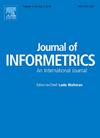Artificial intelligence in scientific research: Challenges, opportunities and the imperative of a human-centric synergy
IF 3.5
2区 管理学
Q2 COMPUTER SCIENCE, INTERDISCIPLINARY APPLICATIONS
引用次数: 0
Abstract
This work offers a critical and evidence-based synthesis of the conceptual, methodological, and social implications of artificial intelligence (AI) in scientific research, significantly enriched by an informetric perspective. The analysis transcends descriptive overviews and simple cataloging of products, providing a deeper understanding of the opportunities AI presents, such as accelerated data analysis, hypothesis generation, and drug discovery. At the same time, crucial challenges that AI introduces are explored, including knowledge monocultures, algorithmic bias, reproducibility issues, and the impact on research integrity and evaluation. The original contribution of this paper lies in the integration of informetric analysis to quantify the influence of AI on the production and dissemination of scientific knowledge, highlighting both its potential as an analytical tool and the risk of bias in the academic record. The paper emphasizes the need for frameworks that harmonize technological capabilities with the irreplaceable ingenuity of human thought, promoting balanced collaboration between AI and researchers, where AI serves as a tool to increase productivity and human oversight ensures ethical rigor, critical evaluation, and creative exploration.
科学研究中的人工智能:挑战、机遇和以人为中心的协同作用的必要性
这项工作提供了人工智能(AI)在科学研究中的概念、方法和社会影响的关键和基于证据的综合,并通过信息学的角度显着丰富。该分析超越了描述性概述和简单的产品分类,提供了对人工智能提供的机会的更深入的理解,例如加速数据分析,假设生成和药物发现。同时,探讨了人工智能带来的关键挑战,包括知识单一文化、算法偏见、可重复性问题以及对研究完整性和评估的影响。本文的原创性贡献在于整合了信息计量学分析,量化了人工智能对科学知识生产和传播的影响,突出了其作为分析工具的潜力和学术记录中存在偏见的风险。该论文强调需要建立框架,使技术能力与人类思想的不可替代的独创性相协调,促进人工智能与研究人员之间的平衡合作,其中人工智能作为提高生产力的工具,人类监督确保道德严谨性、批判性评估和创造性探索。
本文章由计算机程序翻译,如有差异,请以英文原文为准。
求助全文
约1分钟内获得全文
求助全文
来源期刊

Journal of Informetrics
Social Sciences-Library and Information Sciences
CiteScore
6.40
自引率
16.20%
发文量
95
期刊介绍:
Journal of Informetrics (JOI) publishes rigorous high-quality research on quantitative aspects of information science. The main focus of the journal is on topics in bibliometrics, scientometrics, webometrics, patentometrics, altmetrics and research evaluation. Contributions studying informetric problems using methods from other quantitative fields, such as mathematics, statistics, computer science, economics and econometrics, and network science, are especially encouraged. JOI publishes both theoretical and empirical work. In general, case studies, for instance a bibliometric analysis focusing on a specific research field or a specific country, are not considered suitable for publication in JOI, unless they contain innovative methodological elements.
 求助内容:
求助内容: 应助结果提醒方式:
应助结果提醒方式:


